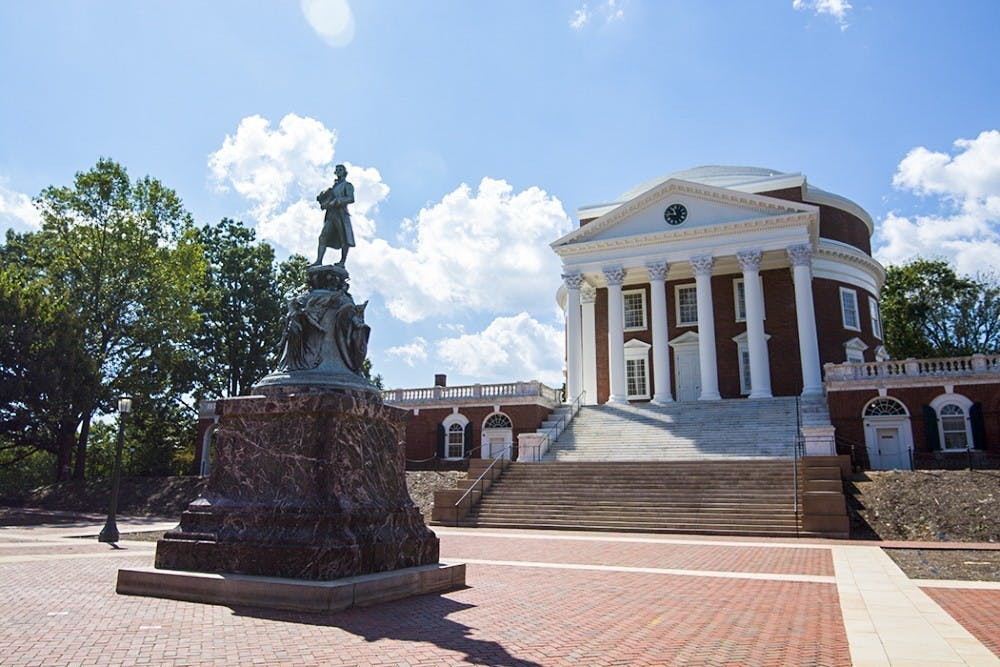One cannot think of the University of Virginia without thinking of a few things — orange and blue, “Wahoowa” and, finally, Thomas Jefferson. The founder of the University is remembered here and in most parts of the nation as a Founding Father, author of the Declaration of Independence and the third President of the United States. Ironically, he practiced and believed in the very opposite of freedom — the enslavement of other people. As the University has moved along in its social and institutional development, there have been several changes to acknowledge and erase the white supremacist and patriarchal ideals that the University was founded on. One token of these ideals, however, remains unaltered — the many statues of one Thomas Jefferson.
As the statues of confident Confederate soldiers and cowering Indigenous people topple down, Jefferson’s statues remain because the University does not link Jefferson to these other obviously bad symbols. Instead, Jefferson is immortalized as a leader and a free thinker. He founded the University, penned the Declaration of Independence and the Virginia Statute for Religious Freedom and doubled the size of the United States during his presidency with the Louisiana Purchase. He also owned 607 enslaved peoples, took 14-year-old Sally Hemings — his wife’s half-sister — for his concubine and actively contributed to institutionalizing race into American systems of government, both ideologically and legally. Even still, for most of the University’s administration and donors, he was a founder and intellectual before he was a racist nationalist, and therefore, the statues stay.
However, the statues will now undergo digital contextualization to give a more accurate representation of their histories. According to the Buildings and Grounds Committee, they will “commission a working group to engage individuals with relevant expertise to create a digitally-enabled narrative, beginning with the statues on Grounds, that presents a balanced and fulsome history of the subject of each statue, as well as the sculptor, and the historical context around its commission and placement on the University’s Grounds.” Instead of knocking Jefferson off of his pedestal — which Jim Ryan has made clear will not happen during his tenure — they will give his pedestal a historical framework to help better understand the “complicated” individual responsible for founding our school. Why is Jefferson so complicated though? Why can we tear down Lee and Jackson within a matter of years — albeit after violent riots and lengthy policy changes — but the University is unable to bring itself to part with Jefferson?
First, let us consider the institutional glorification of Thomas Jefferson at the University. “Mr. Jefferson’s University” is used as often as the actual name of the University. There are statues, pictures and lectures on him almost every week. At first-year students' Opening Convocation ceremony, they even put nickels — which feature the face of Jefferson — on the seats. It is safe to assume that Jefferson’s wrongdoings are quite overshadowed by his contributions to the country, at least in the minds of University administration. The real reason, however, that he is so hard to remove is not simply because the University would have to spend a lot of nickels redesigning everything with his name and face on it. Instead, it is because of the nationalist propaganda that is widespread in this country. Unlike the Confederacy — which has, in recent years, been broadly accepted as treasonist — Jefferson is on the “good side” of history. We identify him as someone who fought for freedom and, as Americans, freedom is the very definition of all that is good. The good-bad binary confuses people with respect to Jefferson because most have placed him on one side. Now, however, it seems as though he belongs to the other. Instead of giving power to this imaginary binary, we should look at people as more complex than either good or bad. Jefferson helped to found our country and our University, and we do not want to admit that his actions in life do not align with the values with which we identify him with.
So, what are we if we are not Mr. Jefferson’s University? We have obviously made a name for ourselves, ranking among the highest in terms of academic achievement, architecture and community. There is often a pride associated with being founded by a famous American president. Still, we have invested a great deal into eugenics, nationalism and Southern gentlemen in the past. However, these aspects of the Academical Village are vanishing over time with the help of student engagement. Still, there are immeasurable discrepancies between our ideas of freedom and whom we honor, and we are not sure how to deal with it.
I know that the statues of Jefferson will likely never be removed, and even if they are, it will not be any time soon. Jefferson is ingrained in the University culture and the nation as a whole. He is often viewed as a representation of all that we want to be, and this image of him will always overpower a truer vision of him, much like other flawed leaders. So, why the article if not to rally the troops? It is to reflect on what makes us a University and a nation — and Jefferson serving as our founder is not what defines us. While Jefferson founded the University centuries ago, this does not mean he should dictate what we become, and it is obvious we do not need Jefferson to succeed. Though it may never happen, taking down the statues would not change the unchangeable fact that Jefferson gave the University life — rather it would exemplify that we have moved beyond his understanding of greatness. Instead of Mr. Jefferson’s University, perhaps it could one day be simply Our University.
Shaleah Tolliver is an Opinion Columnist for The Cavalier Daily. She can be reached at opinion@cavalierdaily.com.
The opinions expressed in this column are not necessarily those of The Cavalier Daily. Columns represent the views of the authors alone.







